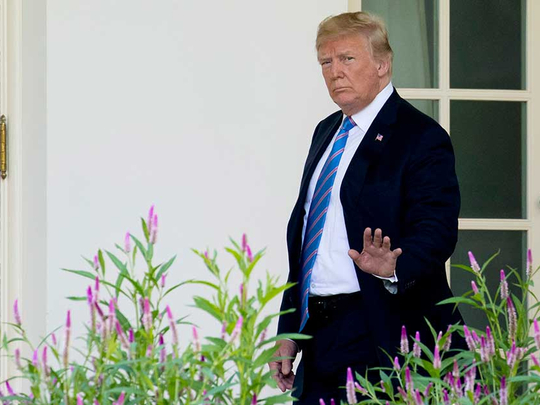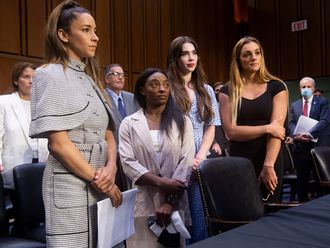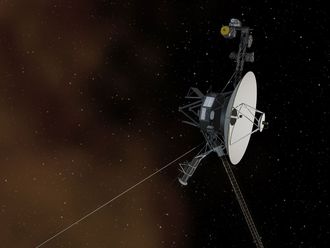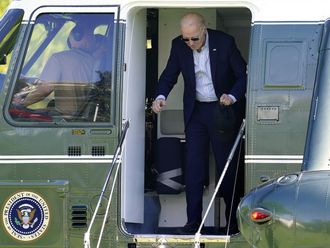
Washington: President Donald Trump on Wednesday sowed even more confusion over his recent meeting with President Vladimir Putin, insisting after a day of conflicting statements about Russia’s interference in the 2016 election that he had actually laid down the law with Putin.
“I let him know we can’t have this,” Trump said in an interview with “CBS Evening News.” “We’re not going to have it, and that’s the way it’s going to be.”
But that statement was almost completely at odds with how the president has characterised the meeting with Putin on Monday in Helsinki, and it contradicted an answer he appeared to give when asked earlier in the day if he believed Russia was still interfering in US elections and he said no.
The White House claimed Trump had yet again been misunderstood. The press secretary, Sarah Huckabee Sanders, said the president had said “no” only to whether he would take questions during a Cabinet meeting, not to whether Russia was still interfering.
“We believe that the threat still exists,” she said, “which is why we are taking steps to prevent it.”
It was the second day of reversals and semantic hairsplitting in the president’s statements about Russia — on Tuesday the president said he had meant to say that at a news conference in Helsinki that he disagreed with a statement by Putin, not that he agreed with it — and it only deepened the mystery of what exactly Trump and the Russian president had talked about during a 2 1/2-hour session in Finland when only their interpreters were in the room with them.
Democrats demanded that Trump’s State Department interpreter be summoned to Capitol Hill to testify about what the president said, a prospect that seemed unlikely, given the lack of Republican support. But Republicans also hardened their criticism of Trump, with lawmakers expressing anger and incredulity at his shifting statements.
Trump has been consistent in some respects. In his CBS interview, he delivered yet another broadside against prominent veterans of the intelligence community, referring to the former director of the CIA, John O. Brennan, as a “total low-life,” and suggesting that someone had gotten to James R. Clapper, a former director of national intelligence.
But Trump tried to dispel perceptions of a rift between him and the current national intelligence director, Dan Coats, who has warned of Russia’s continuing efforts to meddle in US elections. Trump said Coats was doing an “excellent job,” as was the CIA director, Gina Haspel.
“When they tell me something, it means a lot,” he said. The president said of Coats, “He’s a great guy and a great patriot who loves his country, and he’s only going to say what he believes.”
That was a shift from Monday, when the president, standing next to Putin, said that Coats had expressed his views about Russia’s culpability but that Trump had found the Russian leader’s “extremely strong and powerful” denial more persuasive.
“They said they think it’s Russia,” he said. “I have President Putin; he just said it’s not Russia. I will say this: I don’t see any reason why it would be.”
After his words set off a cascade of criticism, Trump claimed that he had misspoken as a result of his failed attempt to use a double negative when he was answering a question about whether he believed Putin or his intelligence agencies.
The latest reversal came on Wednesday during a Cabinet meeting, when reporters and photographers jostled on the other side of a long table from Trump. After a series of statements from Cabinet officials and the president’s daughter, Ivanka, press aides began ordering reporters to leave the room — and one asked Trump if he believed that Russia was still targeting American elections.
“No,” Trump said, going on to say he had been tough on Russia — which he said the news media consistently failed to report.
While these encounters, known as “pool sprays,” are hectic and sometimes confusing — with cross talk and background noise — Trump seemed to be responding to a question about Russia rather than a general request to take questions.
Trump also came under sharp criticism for discussing an agreement with Putin under which Russian authorities would be allowed to question several US citizens that it claims were involved in illegal dealings with a London-based financier and longtime critic of Putin, William F. Browder.
On Monday, Trump said Putin had made an “incredible” offer: to allow the special counsel in the Russia inquiry, Robert Mueller, to interview 12 Russian military intelligence officers indicted last week on a charge of hacking the Democratic National Committee and the Clinton campaign, in return for access to these Americans.
Among the names on the list, a Russian official told the Interfax news agency, is that of Michael A. McFaul, who served as US ambassador to Russia under President Barack Obama. McFaul was sharply critical of the Russian government during his posting in Moscow, and has continued to speak and write regularly about Putin.
“There was some conversation about it, but there wasn’t a commitment made on behalf of the United States,” Sanders said Wednesday. “The president will work with his team and we’ll let you know if there’s an announcement on that front.”












